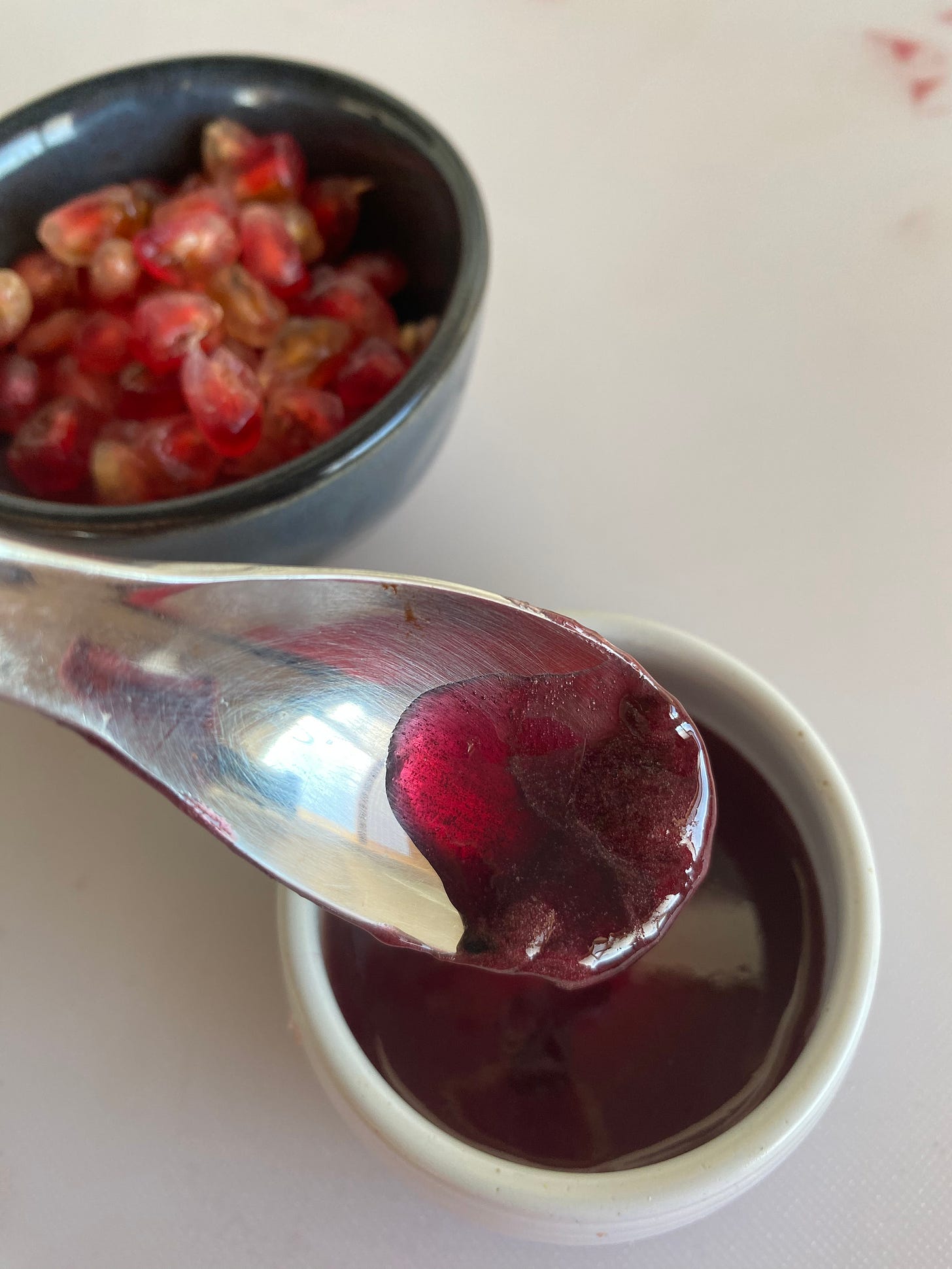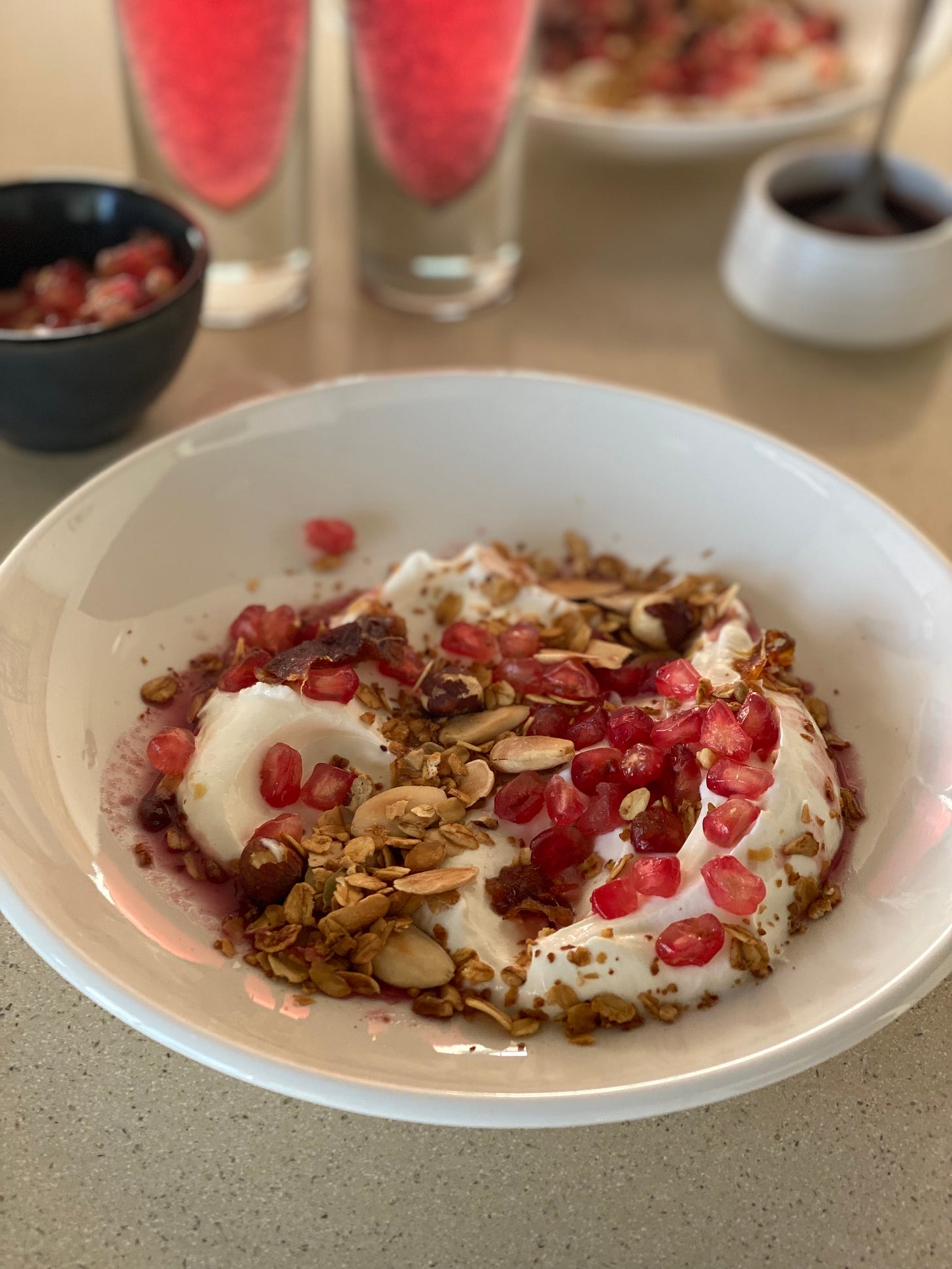Immune Boosting Pomegranate Juice
Here's the quickest way to open a pomegranate.
MY SMILE GROWS as the stall owner piles handful after handful pomegranate seeds into the juicer and I watch a pint of deep ruby red pomegranate juice pouring into my glass. Sweet yet sour, tart and tangy. With each sip, I swear I can feel the juice seeping into my body, replenishing, recharging, restoring.
I should explain.
I’m in Kathmandu, Nepal. Just back from a 21 day trek to Base Camp Everest, my body is completely depleted, drained of energy and craving fruit. Fruit has been rarer than the oxygen for the past three weeks, and this pomegranate juice with its natural sugars and nutrients is reaching parts I didn’t think a juice could.
But even now back home, weeks later and and pomegranate juice has become a regular on our breakfast table. If you like you can take it a step further, reduce the juice to make sticky home-made pomegranate molasses - which I’ll show you in just a minute.
But I jump ahead, first pomegranate juice. Here’s how to open them and why you should …
GETTING HEALTHY BITE BY BITE
We get healthy bite by bite, not in one meal, but in a series of small changes, that together lead to a bigger result.
Nutritional Info: There are 230 calories in one whole pomegranate (80 cals for every 100g of arils), plus good amounts of fibre (10g) and vitamins, especially vitamin C (with each pomegranate supplying 30% of the recommend daily intake).
Boost the immune system. Thanks to the vitamins and anti-oxidants, pomegranates give the immune system a protective boost. Ideal to eat over the winter months, when a strong immune system will help us be more resilient to colds and viruses (read more about this here.)
Keep the gut-healthy fibre. Be aware that by juicing we remove most of the bitter pith making the drink taste sweeter but also we remove most of the fibre. So, I’ll hold back some seeds (called arils) and keep them in a container in the fridge, to sprinkle on yoghurts, or add to salads or just eat by the spoonful; they’re tasty and that way you maintain the fibre benefits too.
Improves sporting performance. And I’ve saved the best one for last! Pomegranate juice has been found in scientific studies to delay muscle fatigue and improve endurance, which is great for those of us who love our sports and exercise. Early research (see here ) also shows how PJ might also help muscle recovery, especially when drunk 60 mins prior to exercise or in the 48 hours after.
Let’s crack on and open up one of these health bombs. Here’s an easy, quick way to open a pomegranate and remove those delicious arils.
Pomegranate Juice
Each pomegranate yields around one small glass of juice.
Step 1: Open the pomegranate
(see the video above)
Cut a pentagon shape in the top and remove lid.
Slice down the outside of the skin.
Pull open, pull out the pith and release the seeds by pushing the back of the pomegranate skin.
Keep in Mind
Typically the arils are a beautiful bright blood-red colour, but can be pale pink or even white.
Step 2: Juice
Add to the juicer and wait for goodness to pour out, drink, and be happy!
Keep in Mind
If you don’t have a juicer, then you can put the seeds into a blender, then pass the juice through a fine sieve.
Any extra can be made into pomegranate molasses (see below) or frozen.
Pomegranate Molasses
If you have managed to resist slugging all the juice all back and have some extra, then you are one slow reduction away from making sweet, syrupy home-made pomegranate molasses.
First, though let’s take a look at how to intensify flavours through reduction.
BECOMING A BETTER COOK
The secret of being a good cook is to enjoy the process of cooking. By understanding the how’s and why’s we gain more confidence in the kitchen.
What’s a reduction? Reducing a liquid intensifies flavours and thickens the liquid. The process is simple enough - heat the liquid to evaporate off the water content. As you do, you’ll see steam evaporating and the remaining liquid thickening as it concentrates.
Reducing is a useful skill to have that can be used with stocks, wines, vinegars - and of course other juices. Restaurants will reduce stocks to intensify flavour and also they will do it for storage and organisation. In one restaurant I worked in, we reduced paella stocks to precisely weighed quantities, which were then frozen into cubes, and brought out for service, defrosted in the pan and rehydrated with water, to make the rice dish.
Fast v Slow reduction? As tempting as it is to bang the heat up, you’ll get a tastier result if you simmer rather than boil off the water. If you want to speed up the process reduce in a wide based pan as the larger the surface area will allow for more evaporation.
Onwards. And onto those sticky, delicious molasses … here’s how:
Pomegranate Molasses
2-6 pomegranates
Squeeze of lemon
Step 1: Make the reduction
Reduce the fresh pomegranate juice and lemon juice over a low heat.
Here’s how
Add the juice from at least two (preferably more) pomegranates to a wide based pan and a good squeeze of fresh lemon juice.
Simmer gently - low heat.
Stop when the juice has thickened and coats the back of a spoon.
Store in an air-tight container in the fridge.
Keep in Mind
At first, it will appear to take ages to reduce, but keep an eye on it - especially near the end of the process when it can reduce to nothing fast.
If this happens (and you haven’t burnt it) you can save it by adding in more fresh juice or water to the very concentrated reduction.
Here’s how you might use your delicious, sticky molasses
Drizzled on top of some greek yoghurt along with toasted sliced almonds, lemon zest and fresh pomegranate seeds
Dripped over roasted aubergine, cumin seeds, on a bed of hummus and tahini.
Glazed over duck breast, with fresh orange slices, and caramelised red onion.
More on Olympian Kitchen
Traditional Spanish Tortilla de Patata
How to cook eggs so they don't dry out and go rubbery, how to make a Spanish Omelette and how to flip it so your dinner doesn't end up on the floor.
Day 25: The fear of the new
Today is Day 25 of the 100 Day Chef Stage, and I’m meant to be starting at a new kitchen. But only if I can prise my fingers off the steering wheel and get up the courage to walk through the front door. Right now, I am frozen to the spot.
Olympian Kitchen is written by Nicola Fairbrother MBE, 8th Dan, Olympic silver medallist.
More about my work and me. I’m Nicola Fairbrother. I’m a double Olympian (Barcelona 1992 Silver and Atlanta 1996 5th), light-weight World Champion (1993), triple European Champion, voted by Sunday Times as Sportswoman of the Year and awarded a MBE by HM The Queen. I publish a range of children’s judo books (Koka Kids) and run another substack delivering judo coaching resources. I’m a trained chef (Leiths Professional Diploma) and have completed a 100 day chef-stage in Spanish Michelin kitchens.















❤️ love it!
Love the simplicity.
Love how you explain. It's nice to understand what and why's
I love this juice 😍